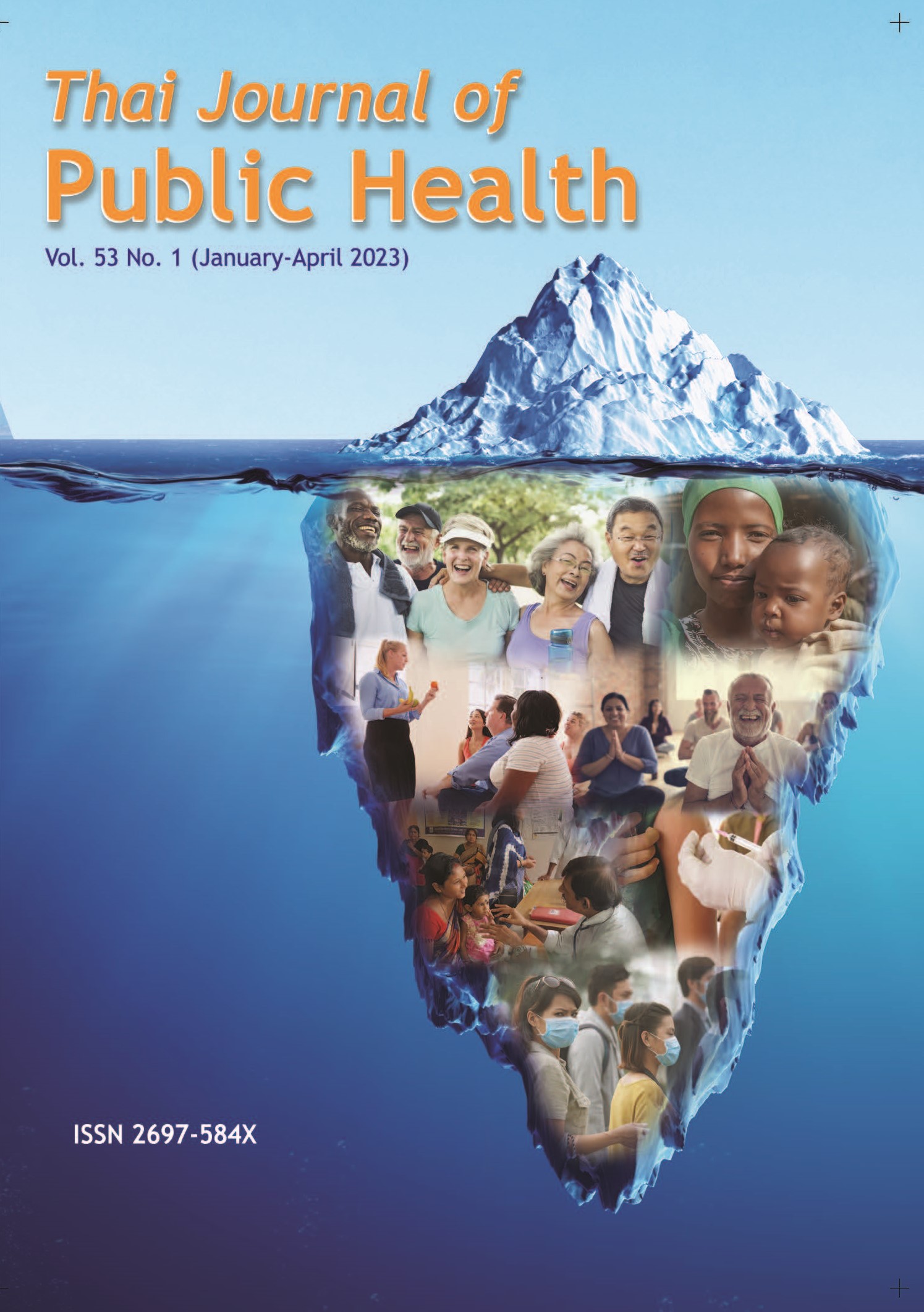The Relationship between Health Literacy, Prevention Behaviors, and COVID-19 Infection among Industrial Workers in Chachoengsao Province, Thailand
Keywords:
Health Literacy, Prevention Behaviors, COVID-19 Infection, Industrial WorkersAbstract
This study was a cross-sectional correlational study to examine the relationship between health literacy, prevention behaviors, and COVID-19 infection among industrial workers in Chachoengsao province, Thailand. Between January and February 2022, purposive sampling was carried out to recruit 92 industrial workers as inclusion and exclusion criteria from Chachoengsao province, Thailand. Data collection was based on an HL questionnaire. The HL is comprised of six domains. There is an assessment of information and services, knowledge and understanding of health, communication with professionals, making appropriate health decisions on good practices, managing health information, and getting media and information literacy. The prevention behavior questionnaire was based on COVID-19 infections. The measurement reliability was reported as Cronbach alpha = 0.895 to 0.919, respectively. The data was analyzed using descriptive statistics, including frequency, percentage, mean, standard deviation, and range. Moreover, to analyze the relationships between study variables using the correlational coefficient and Chi-square statistic, the p-value of .05 was considered statistically significant. Results showed that industrial workers had a high level of health literacy and COVID-19 prevention behavior. Health literacy was significantly positively correlated with prevention behavior (rs = 0.508, p = 0.000). In addition, there was no significant positive correlation between COVID-19 infection and health literacy (χ2 = 3.420, p = 0.230), but it was significantly related to prevention behaviors (χ2 = 92.000, p = 0.000). The results of the study demonstrated that promoting health literacy is an important strategy for improving prevention behaviors among industrial workers. The roles of occupational nurses are critical to promoting and providing appropriate responses and could effectively control the spread of COVID-19.
References
Dubey S, Biswas P, Ghosh R, Chatterjee S, Dubey MJ, Chatterjee S, et al. Psychosocial impact of COVID-19. Diabetes Metab Syndr 2020; 14(5): 779-88. DOI: 10.1016/j.dsx.2020.05.035.
The Federation of Thai Industries. Guidelines for responding to the COVID-19 situation and business continuity measures for the industrial sector. Available from: https://fti.or.th/news_fticovid-19/, accessed 14 December 2021.
Sun J, Lee H, Yang J. The COVID-19 pandemic's impact on the global value chain of the manufacturing industry. Sustainability 2021; 13: 12370.
Nutbeam D. Health literacy as a public health goal: A challenge for contemporary health education and communication strategies into the 21st century. Health Promot Int 2000; 15(3): 259-67. DOI: 10.1093/heapro/15.3.259.
McDonald M, Shenkman L. Health literacy and health outcomes of adults in the United States: Implications for providers. Internet J Allied Health Sci Pract 2018; 16(4). DOI: 10.46743/1540-580X/2018.1689.
Unai K, Chaiwang P, Korakodkamchon B, Panjarean D. Health literacy and behaviors to prevent COVID-19 among older persons at risk for dementia in a rural community in Chiang Rai province. Nursing Journal CMU 2022; 49(1): 200-12. (in Thai)
Nakayama K, Yonekura Y, Danya H, Hagiwara K. COVID-19 prevention behaviors and health literacy, information evaluation, and decision-making skills in Japanese adults: A cross-sectional survey study. JMIR Formative Research 2022; 6(1): e34966. DOI: 10.2196/34966.
The United Nations Industrial Development Organization. Impact assessment of COVID-19 on the Thai industrial sector. Available from: https://www.unido.org/sites/default/files/files/2020-06/Impacts_of_COVID19_on_Thai_industrial_sector_0.pdf, accessed 14 December 2021.
Choojai R, Boonsiri C, Patcheep K. Effects of a health literacy enhancement program for COVID-19 prevention on health literacy and prevention behavior of COVID-19 among village health volunteers in Don Tako Sub-district, Mueang District, Ratchaburi province. SCNJ 2021; 8(1): 250-62. (in Thai)
Turale S. COVID-19: Nursing challenges into the future. Pac Rim Int J Nurs Res 2021; 25(2): 165-70.
European Commission. COVID-19 in vitro diagnostic medical device – detail SARS-CoV-2 antigen detection kit (colloidal gold method). Available from https://covid-19-diagnostics.jrc.ec.europa.eu/devices/detail/1588, accessed 20 April 2022.
Lastrucci V, Lorini C, Del Riccio M, Gori E, Chiesi F, Moscadelli A, et al. The role of health literacy in COVID-19 prevention behaviors and infection risk perception: Evidence from a population-based sample of essential frontline workers during the lockdown in the province of Prato (Tuscany, Italy). Int J Environ Res 2021; 18(24): 13386. DOI: 10.3390/ijerph182413386.
Turhan Z, Dilcen HY, Dolu I. The mediating role of health literacy on the relationship between healthcare system distrust and vaccine hesitancy during the COVID-19 pandemic. Current Psychology 2021; 1-10. DOI: 10.1007/s12144-021-02105-8.
Yodmai K, Pechrapa K, Kittipichai W, Charupoonpol P, Suksatan W. Factors associated with good COVID-19 prevention behaviors among older adults in urban communities in Thailand. J Prim Care Community Health 2021; 12: 1-9. DOI: 10.1177/21501327211036251.
Van de Mortel TF. Faking it: social desirability response bias in self-report research. Aust J Adv Nurs 2008; 25(4): 40-8.
Bahramian M, Najimi A, Omid A. Association between health literacy with knowledge, attitude, and performance of health-care providers in applying health literacy education strategies for health education delivery. Journal Educ and Health Promot 2020; 9. DOI: 10.4103/jehp.jehp_199_19.
Schober P, Boer C, Schwarte LA. Correlation coefficients: Appropriate use and interpretation. Anesthesia & Analgesia 2018; 126(5): 1763-8. DOI: 10.1213/ANE.0000000000002864.
Greer M L, Sample S, Jensen H K, McBain S, Lipschitz R, & Sexton K W. (2021). COVID-19 is connected with lower health literacy in rural areas. Stud Health Technol Inform 2021; 281: 804. DOI: 10.3233/SHTI210286.
Downloads
Published
Issue
Section
License

This work is licensed under a Creative Commons Attribution-NonCommercial-NoDerivatives 4.0 International License.
Creative Commons License CC-BY-ND


